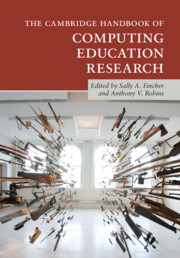Crossref Citations
This Book has been
cited by the following publications. This list is generated based on data provided by Crossref.
Gomes, Anabela
Teixeira, Ana Rita Assuncao
Eloy, Joana
and
Mendes, Antonio Jose
2019.
An Exploratory Study of Brain Computer Interfaces in Computer Science Education.
IEEE Revista Iberoamericana de Tecnologias del Aprendizaje,
Vol. 14,
Issue. 4,
p.
152.
Tshukudu, Ethel
and
Jensen, Siri Annethe Moe
2020.
The Role of Explicit Instruction on Students Learning their Second Programming Language.
p.
10.
Singh, Paramvir
Tempero, Ewan
Luxton-Reilly, Andrew
and
Zhang, Shuxiang
2020.
Digging into Computer Science Students’ Learning Journals.
p.
1.
Tshukudu, Ethel
and
Cutts, Quintin
2020.
Understanding Conceptual Transfer for Students Learning New Programming Languages.
p.
227.
Mirolo, Claudio
Izu, Cruz
and
Scapin, Emanuele
2020.
High-school students' mastery of basic flow-control constructs through the lens of reversibility.
p.
1.
Pirker, Johanna
Dengel, Andreas
Holly, Michael
and
Safikhani, Saeed
2020.
Virtual Reality in Computer Science Education: A Systematic Review.
p.
1.
Lodi, Michael
and
Martini, Simone
2021.
Computational Thinking, Between Papert and Wing.
Science & Education,
Vol. 30,
Issue. 4,
p.
883.
Pirker, Johanna
Kopf, Johannes
Kainz, Alexander
Dengel, Andreas
and
Buchbauer, Benjamin
2021.
The Potential of Virtual Reality for Computer Science Education -Engaging Students through Immersive Visualizations.
p.
297.
Bettin, Briana
and
Ott, Linda
2021.
Frozen in the Past: When it Comes to Analogy Fears, It's Time For Us to "Let it Go".
p.
359.
Pöhner, Nicolai
Hennecke, Martin
and
Fleige, Markus
2021.
Robotics in Education.
Vol. 1316,
Issue. ,
p.
163.
Van Mechelen, Maarten
Wagner, Marie-Louise
Baykal, Gökçe Elif
Charlotte Smith, Rachel
and
Iversen, Ole Sejer
2021.
Digital Design Literacy in K-9 Education: Experiences from Pioneer Teachers.
p.
32.
Awoyemi, Richard Oluwadolapo
and
Awoyemi, Robert Akinade
2021.
Handbook of Research on Equity in Computer Science in P-16 Education.
p.
165.
Singh, Paramvir
Tempero, Ewan
Luxton-Reilly, Andrew
and
Zhang, Shuxiang
2021.
What do they note? An exploratory investigation into the characteristics of CS students’ notes.
p.
57.
Švábenský, Valdemar
Vykopal, Jan
Čeleda, Pavel
and
Kraus, Lydia
2022.
Applications of educational data mining and learning analytics on data from cybersecurity training.
Education and Information Technologies,
Vol. 27,
Issue. 9,
p.
12179.
Weidmann, Theo B.
Thorgeirsson, Sverrir
and
Su, Zhendong
2022.
Bridging the Syntax-Semantics Gap of Programming.
p.
80.
Tenenberg, Josh
and
Malmi, Lauri
2022.
Editorial: Conceptualizing and Using Theory in Computing Education Research.
ACM Transactions on Computing Education,
Vol. 22,
Issue. 4,
p.
1.
Ross, Monique
Farhangi, Sanaz
Patel, Disha
Waisome, Jeremy Magruder
and
Garcia, Atalie
2022.
TRAVERSING THE LANDSCAPE OF COMPUTER SCIENCE: A CASE STUDY OF BLACK WOMEN'S IDENTITY AND SENSE OF BELONGING IN A COMPUTER SCIENCE DOCTORAL PROGRAM
.
Journal of Women and Minorities in Science and Engineering,
Vol. 28,
Issue. 5,
p.
69.
Moster, Makayla
Kokinda, Ella
Re, Matthew
Dominic, James
Lehmann, Jason
Begel, Andrew
and
Rodeghero, Paige
2022.
"Can you help me?".
p.
50.
Lunn, Stephanie
Samary, Maíra Marques
Hambrusch, Susanne
and
Yadav, Aman
2022.
Forging a Path: Faculty Interviews on the Present and Future of Computer Science Education in the United States.
ACM Transactions on Computing Education,
Vol. 22,
Issue. 4,
p.
1.
Spikol, Daniel
Dybdal, Martin
and
Elmeskov, Dorte C.
2022.
Student experiences in a university preparatory programming course.
Frontiers in Computer Science,
Vol. 4,
Issue. ,



